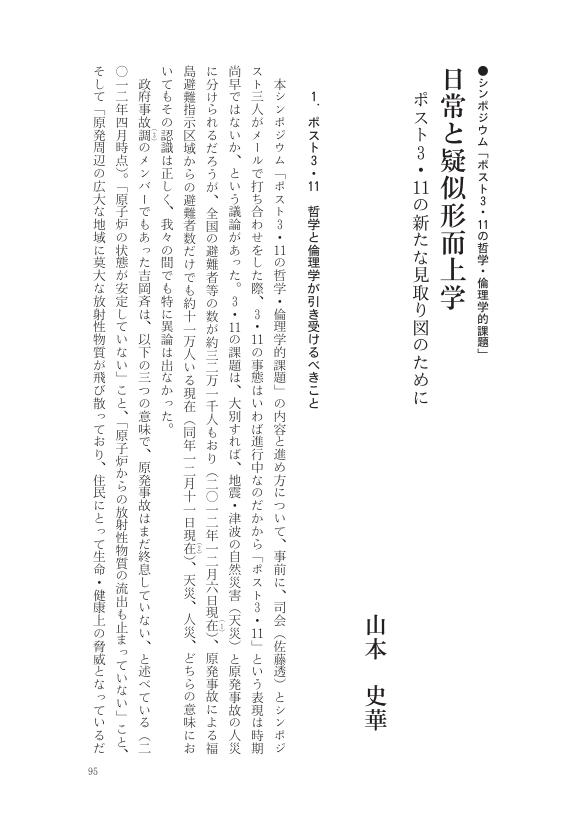1 0 0 0 OA 日常と疑似形而上学 ポスト3・11の新たな見取り図のために
- 著者
- 山本 史華
- 出版者
- 東北哲学会
- 雑誌
- 東北哲学会年報 (ISSN:09139354)
- 巻号頁・発行日
- vol.29, pp.95-110, 2013 (Released:2022-08-02)
1 0 0 0 OA 現代の倫理的なイラ立ちについて 共生と寛容の手前で
- 著者
- 山本 史華
- 出版者
- 東北哲学会
- 雑誌
- 東北哲学会年報 (ISSN:09139354)
- 巻号頁・発行日
- vol.26, pp.29-44, 2010 (Released:2022-07-29)
- 著者
- 山本 史華
- 出版者
- 東北哲学会
- 雑誌
- 東北哲学会年報 (ISSN:09139354)
- 巻号頁・発行日
- vol.14, pp.64-65, 1998-04-30 (Released:2018-02-28)
1 0 0 0 OA 臨床研究におけるアフターケア倫理 : その理念の提示
- 著者
- 山本 史華
- 出版者
- 日本医学哲学・倫理学会
- 雑誌
- 医学哲学 医学倫理 (ISSN:02896427)
- 巻号頁・発行日
- vol.25, pp.31-39, 2007-10-18 (Released:2018-02-01)
Few of the current guidelines on clinical research mention ex post issues. For example, the Declaration of Helsinki includes as such an issue only its 30th Article and note. As for concrete ethical requirements, that is, Informed Consent, Assessment of Risks and Benefits and Selection of Subjects, the chief aim covers all aspects of applying the regulations to the preconditions. Emphasis was for a long time focused on how ethical principles regulate ex ante issues. In recent years, based on reflection on this situation, the need for ex post ethics has gradually become clear. Patricia A. King notes, in Belmont Revisited, that fairness requires specific compensatory justice and procedural justice, both of which were ignored in the Belmont Report. This paper aims to construct the idea of ex post ethics, which we call aftercare ethics, through examination of the principles of biomedical ethics. Chapter 1 confirms the fact that compensation and free medical treatment for accidental injury or damage are extremely rare in guidelines for clinical research. In Chapter 2, we address the problems of the emotions of the injured and the compensation. The reason why they were absent from clinical research is examined. In Chapter 3, it is shown that if we reinterpret the principles of respect for persons and of justice, we can see that the ethical necessity referred to in the preceding chapter can be derived from the said principles. Finally, in Chapter 4, we present the basic idea of aftercare ethics.


